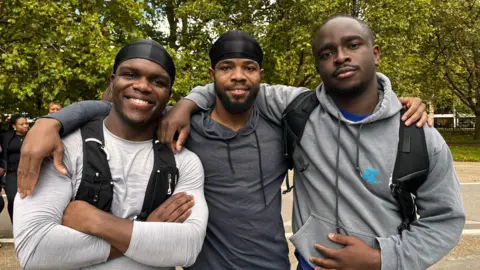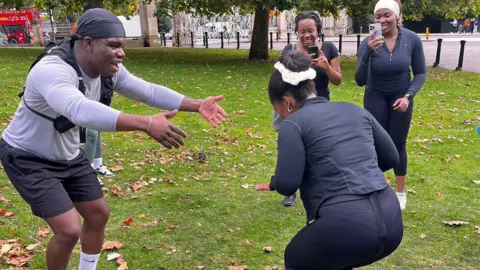 Danai Nesta Kupemba / BBC
Danai Nesta Kupemba / BBCIn London's famous Hyde Park, around 11 a.m. on a cool Saturday morning, runners gather on benches – some tall and thin, others wide and sturdy, a few log into the Strava app, but one common thread unites them – most of them. are Nigerians of Igbo origin.
This is the Ozo Running Club, formed by the Igbo people to celebrate the culture of one of Nigeria's largest ethnic groups, numbering over 300 people.
“We wanted to create a space where Igbo youth could connect and reconnect with their culture,” said Chibueze Odoemene, co-founder of the club with Emeka Atumonyogo and Chigo Ogbonna.
In less than three months, the Ozo running club already has more than 300 members.
This quick the growth speaks not only to the deep desire for community, but also to the significant rise of social running clubs in recent years.
Stravathe popular running app, said there has been a 59% increase in participation from running clubs around the world this year.
But for the Ozo Running Club, the weekly Saturday meetings aren't just about running, pacing or fitness: it's a place where strangers become family.
Even as runners wait to join their respective speed groups – fast, medium, slow and walking pace – a buzz and energy cuts through the quiet of the park as Afrobeats music blares from a nearby speaker.
“Igbo kwenu!” » shouts Mr. Odoemene, his voice echoing through the park to attract everyone's attention.
The group responds in unison with a low, rumbling “Eyy.”
“Igbo kwezo!” » » he shouts again, in a tone that is both authoritarian and warm.
Once again, a unified “Eyy” ensues, resounding among the runners and setting the tone for the morning.
This traditional Igbo call and response is more than a greeting: it is a moment of pride, a reminder of common roots and identity that runs as deep as their commitment to each other and the weekly run.
“The song is used as a call for unity, community and love among all Igbo people,” Mr Odoemene said.
Running clubs like Ozo, which are often free, have become spaces for people to make new friends, build community, and maybe even meet future partners.
The co-founders, who met at other Igbo social events, laugh at the prospect of a romance blossoming at their club.
“If people meet the love of their life, that’s amazing, but the most important thing for us is to build a fun community,” Mr Odoemene said.
For Francesca Ngozi Ezennolim, 21, the prospect of romance is not what brought her from Reading, about 40 miles from London, on a Saturday morning, but the promise of community.
“I don’t have a lot of Igbo friends,” she said, adding: “I have a lot of Nigerian friends, but it’s hard to find Igbo friends.”
Dressed in black sports gear, she told the BBC she hoped the running club would fill that void in her life.
And she's not alone.
Jennifer Iwuamadi, 23, a newcomer to the club, echoed the same sentiments.
“It is very important to come to an Igbo-run club because we can socialize with our brothers and sisters. It’s a great way to get fit and network,” she said.
Although the Igbos are one of Nigeria's largest ethnic groups and are prominent in the diaspora, many believe their culture is under threat. In 2006, the United Nations Cultural Organization (UNESCO) predicted that the Igbo language would disappear by 2025.
However, in the UK their numbers have increased over the past decade, from around 8,000 to 11,000, according to the Office for National Statistics.
In contrast, the number of speakers of Yoruba, the other main language of southern Nigeria, fell from 15,000 to 10,000 during the same period.
Nonetheless, some young Igbo people told the BBC they struggled to make friends outside their parents' community.
“I have so many Yoruba friends, but I want to meet people from my tribe,” Ms Ezennolim told the BBC.
“When people think of Nigerians, they don’t really think of Igbo. Nigeria is not just one piece, it is many pieces,” Mr. Odoemene said.
But isn’t it divisive to have a running club that focuses on Igbo culture?
The founders shake their heads vehemently.
“You don’t have to be Igbo to come to the running club,” Mr Atumonyogo said.
He adds that people from Iran, Italy and the Caribbean have come to their sessions and encourage others to join them, learn about Igbo culture, ask questions and immerse themselves in the vibrant atmosphere.
Yet behind the joy and camaraderie lies a darker side to Igbo history.
In Nigeria, many people still associate the Igbos with the Biafran War of 1967 to 1970, which left an estimated one million people dead after Igbo leaders in the southeast led a campaign of secession from the rest of the country.
Decades later, the wounds of the war remain raw and still shape to some extent how the Igbo are perceived, both at home and abroad.
In his book The Trouble with Nigeria, the late Chinua Achebe, one of Nigeria's most renowned authors, who was Igbo, said: “Nigerians will probably only reach consensus on their common resentment against the Igbo. »
 Danai Nesta Kupemba / BBC
Danai Nesta Kupemba / BBCThese words convey – from the perspective of many Igbos – a story of marginalization that continues to resonate.
For them, this story underscores a deeper purpose: the desire to make their mark and amplify Igbo representation.
Uzoma Ehziem, 34, who moved to the UK almost two decades ago, said he did not think Igbo culture received the attention it deserves.
He is one of the club's leaders and believes that Yoruba culture dominates what many in the UK and around the world consider 'Nigerian'.
From legendary Afrobeat pioneer Fela Kuti to Africa's first Nobel laureate Wole Soyinka, to contemporary stars like Davido, Ayra Starr and Tems, many of the most notable figures in Nigerian pop culture are Yoruba.
The exception is literature, where Achebe and contemporary Igbo authors like Chimamanda Ngozi Adichie and Akwaeke Emezi have achieved international fame.
Many members of the running club believe that the world should know more about the Igbo people.
“If you tell someone you're Nigerian, the first thing they'll ask is, 'Are you Yoruba?'” Mr. Ehziem said.
The club doesn't just organize running sessions. He added monthly social outings for community members – from karaoke to dodgeball sessions and even an Igbo gala that will take place next year.
But for now, the weekly running clubs have become a source of joy and camaraderie for members.
As the race comes to an end and the whole group is back on the benches, Mr. Odoemene brings the runners together with the same song of unity.
Old friends catch up and new friends say hello.
People exchange phone numbers, and as they go their separate ways, the promise of meeting again next Saturday serves as a reminder that this is not just a fleeting encounter but the beginning of lasting relationships rooted in community pride and cultural.
More Nigeria stories from the BBC:
 Getty Images/BBC
Getty Images/BBC#Nigerian #Igbos #form #running #club #strengthen #bonds
